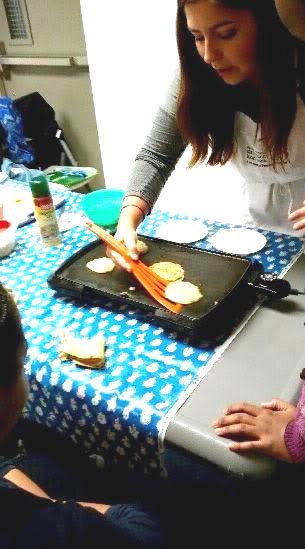Food Matters
As I began my service year, I was confident that my personal struggles and experiences would help define my position at the Greater Pittsburgh Community Food Bank (GPCFB). The GPCFB’s mission is focused around food security by feeding people in need and mobilizing the community to eliminate hunger. The mission sounds simple, but it is more complex than I could have imagined. Hunger may be the result of food insecurity, which is built on three key concepts. In order to fight hunger, we must first establish food security. Food availability, access, and use define food security. After understanding just how each of these components play a huge role in defining food security, I realized my knowledge on food security was not as great as I thought. However, I was still assured that my ability to address food use was strong. Growing up, we did not always have a fully stocked fridge, so there were times I had to get creative. This is where my love of food began. I started experimenting with food at a young age, trying to make something out of nothing. Sometimes, it was like being on an episode of Chopped, and I started to have a lot of fun with food! Instead of focusing on the negative by constantly complaining that there was “nothing” to eat, I focused on making use of what we had. I developed a skillset that would prove useful through my college years and into my service year with National Health Corps.
For me, food access was to the most difficult aspect of food security to comprehend. After conducting several cooking demos and Kids Cook classes in the community, I noticed an overbearing trend. People who could be receiving food assistance, simply were not. From then on, I understood how connecting people with the necessary resources to increase food access would be of intrinsic value to my service. I knew that my cooking demos addressing food use were important, but if people were not receiving the appropriate foods they needed and could receive, my cooking demos were arbitrary. I started bringing information on SNAP (Supplemental Nutrition Assistance Program), Produce to People (a program where families receive 30-50 lbs of fresh produce), and food pantries closest to them. I hoped that these resources would help increase food access and therefore food availability for the families in the greater Pittsburgh community.
With my service as a family-based lead nutrition educator, I mainly conduct cooking demos for parents, where the main goal is to educate adults on use of nutritious foods and knowledge that they can bring home to their families. At some of my demos, I also get to reach children, which I have recognized as some of the most eye-opening and rewarding experiences. A cooking demo I conducted at a Halloween event at a local YMCA would be one of these experiences. It was a great event, with several local organizations and community members tabling and handing out resources.Yet there was element that I knew I could not compete with: candy. As soon as I saw how much candy was flying around, I almost gave up. There was no way my sweet acorn squash could compete with the chocolatey confections. I tried to stay confident and began preparing the squash. I had several parents taste and compliment the recipe, but what about the kids? One teenager came up and tried the squash. He was instantly impressed, and this is where I learned an extremely valuable lesson on how impressionable and receptive kids can be. Once the word got out, my table rushed with kids, even asking for seconds! They had forgotten about the candy--pure success. This experience would help me with all my Kids Cook classes, where I learned the importance and power of embracing positive influences.

I do not get to reach as many children as I do adults, but when I do, I make sure the experience is worthwhile for them. Teaching them knowledge on protein, for example, and skills such as cracking an egg, I hope that they will take these lessons home with them where they can begin experimenting with food, as I did at a young age. I anticipate to make an impact on them and help them create a confidence in the kitchen. If they are struggling with food insecurity at home, I want them to learn how to have fun with food by creating something with the food they have, making their own minimalist masterpieces.